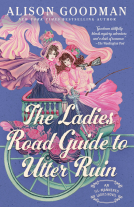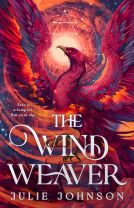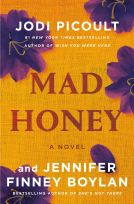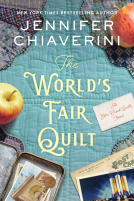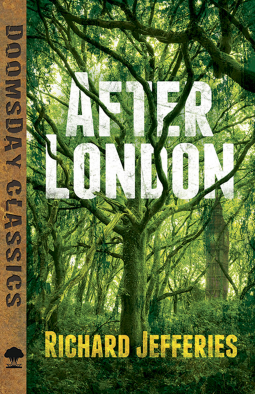
After London
by Richard Jefferies
This title was previously available on NetGalley and is now archived.
Send NetGalley books directly to your Kindle or Kindle app
1
To read on a Kindle or Kindle app, please add kindle@netgalley.com as an approved email address to receive files in your Amazon account. Click here for step-by-step instructions.
2
Also find your Kindle email address within your Amazon account, and enter it here.
Pub Date Sep 16 2015 | Archive Date Dec 09 2015
Description
Characterized by the Observer as "the most beautiful of Victorian novels," this 1885 tale pioneered the post-apocalyptic genre of science fiction. Author Richard Jefferies was a noted naturalist, and his scientific expertise informs the evocative descriptions of birds, plants, and animals. An avid lover of wilderness, Jeffries devised a fantasy that places humanity in a state closer to nature. After London influenced William Morris, J. R .R. Tolkien, and countless other writers, and it remains a haunting tale of environmental collapse and dynamic adventure.
Available Editions
| EDITION | Paperback |
| ISBN | 9780486797496 |
| PRICE | $12.95 (USD) |
Featured Reviews
 Reviewer 124126
Reviewer 124126
This was very different from the normal post-apocalyptic fare, and quite refreshing once I'd adapted to the slower pace. It was originally published in 1885, which surprised me, because I probably would have dated it at least 40 years later.
Don't expect a thrilling fast-moving adventure tale with a defined ending. Expect a detailed, immersive encyclopedic picture of the wilderness that took over from a civilisation over 30 years ago, of the animals' adaptations, of the human cultural changes and the understanding that what caused this destruction has probably been lost in the transition to oral history. The first fifth gives the reader a view through the distant lens of time, as if a time lapse camera were panning across the scene. What emerges is a quasi-feudal society, where a younger, landless son must set off on a quest to find something of value to win the hand of the woman he loves, finding his understanding of real life somewhat flawed in the process.
 Josef H, Reviewer
Josef H, Reviewer
Dover Publications is reprinting books of apocalyptic fiction in its “Doomsday Classics” line of books and these books, of course, are instant must reads for me. I continued the books in the series with “After London” by Richard Jefferies.
A sudden catastrophe struck the world and civilization was destroyed in one fell swoop. The survivors returned to a more primal way of life similar to that which was led before the Middle Ages. London became a primitive swamp and bands of survivors survived more than lived in the wasteland of what was once England in a feudal society that was built more upon simply surviving rather than thriving.
Felix Aquila must navigate his way through the new world and try to make a life for himself. This is not an easy task with little semblance of civilization to hold the world together in a unified society. He must battle with the primal land that he lives in as well as with other tribes that are set on killing the other tribes or, even worse, enslaving them. It is a world without rules and yet Felix must strive for a unifying element to create a better life for himself and search for love that he believes he will find with another woman, Aurora, who is also struggling against the harsh planet that Earth has become.
“After London” is an interesting novel that is clearly a product of its time. Jefferies shines in his description of the post-apocalyptic world and the book soars in its opening as he builds the world after the disaster has struck. Jefferies provides lush detail of the world and how much it has changed with society has fallen so that the reader feels as if this is something that has been witnessed and is being described rather than product of the writer’s imagination. There is not a lot of action in the book and this may not appeal to some readers but the novel is clearly a Victorian novel and a good example of the literature of the time. It reads long for its shorter page count but that is due to the lush detail that Jefferies lavishes on the story to make the setting come to life.
Once Jefferies turns from describing the now –primal land, the story begins to falter somewhat as the narrative of Felix just is not very compelling. The story still lives through the lush description that the author provides but the story of Felix’s journey through the world fails to captivate. The novel is remarkable in its early take on the apocalypse, it was originally published in 1885, but it does take some work to get through. It does, however, throw down the gauntlet for future apocalyptic novels to follow and deserves a new audience for that alone. Readers who enjoy apocalyptic fiction and Victorian fiction are sure to find enough in this novel to make it worth reading but it is difficult to imagine the novel finding a new audience with its dated albeit stunning prose.
I would like to thank Dover Publications and NetGalley for this review copy. “After London” is available now.
Readers who liked this book also liked:
Jodi Picoult; Jennifer Finney Boylan
General Fiction (Adult), Literary Fiction, Women's Fiction
Jennifer Chiaverini
General Fiction (Adult), Parenting & Families, Women's Fiction
